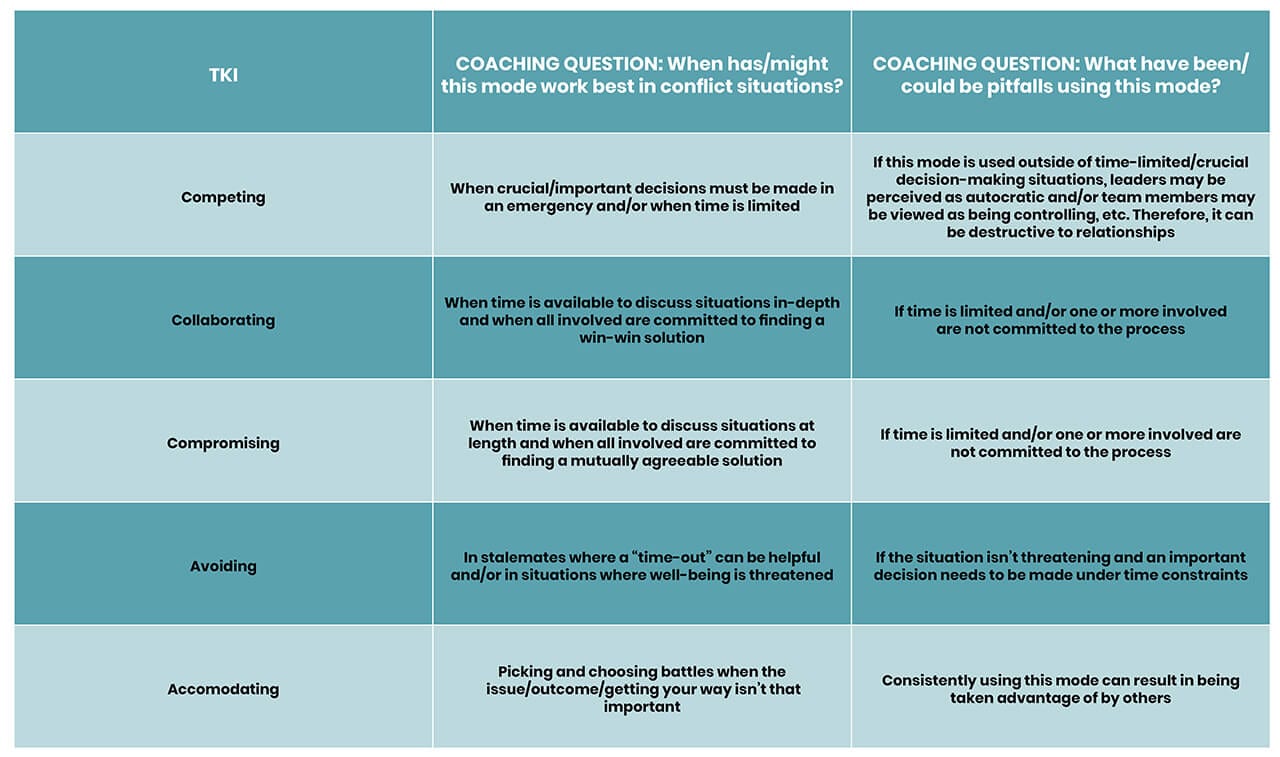5 Ways to Leverage Assertiveness and Cooperativeness in Conflict Situations Using TKI
The Thomas-Kilmann Conflict Mode Instrument (TKI) is a superb tool that helps clients identify and break unresourceful patterns in handling conflict with others. For more than four decades, TKI has been the leading conflict resolution assessment.
Created by Ralph H. Kilmann, Ph.D., and Kenneth W. Thomas, Ph.D., TKI measures the way conflict is handled in relation to two behavioral dimensions: Assertiveness (the degree to which one satisfies their own concerns) and Cooperativeness (the degree to which one satisfies another person’s concerns).
The above two dimensions define the following five TKI conflict handling modes:
- Competing (High Assertiveness and Low Cooperativeness) – Involves standing one’s ground, focusing on winning an argument/debate, etc.
- Collaborative (High Assertiveness and Cooperativeness) – Involves working with others to find solutions that will result in a win-win situation
- Compromising (Moderate Assertiveness and Cooperativeness) – Involves working with others to find middle ground and settling on an agreement regarding the solution
- Avoiding (Low Assertiveness and Cooperativeness) – Involves choosing not to engage in conflict
- Accommodating (Low Assertiveness and High Cooperativeness) – Involves a level of self-sacrifice by giving in, placating, etc.
Everyone has the capacity to use each of the five modes; however, in my experience, most tend to primarily use one to three modes consistently.
Coaching helps clients break unresourceful patterns of behaviors and adapt new, effective ones. That can be accomplished through awareness of one’s preferred TKI conflict handling mode(s)—as well as the remaining modes not typically accessed. Coaching often focuses on developing the capacity to slow down, assess the situation at hand and mindfully choose which TKI mode would likely be the most effective in the situation. This results in shifting to an empowered response versus knee-jerk reaction.
Whether in an individual or group setting, coaching can help clients explore when using each of the five modes may, or may not be, effective in conflict situations. From basic coaching questions, clients discover the following, drawing on their work-life examples.

While collaborating or compromising are typically deemed the best approaches to conflict through coaching with TKI, insight is gained in the realization that any one of the five modes can be the most effective approach to use, depending on the situation.
Clients consistently realize and appreciate that it can be ineffective to use only one of the five modes in handling all conflict situations and that their least used modes present stretch opportunities for growth.
Through coaching with TKI, clients quickly realize the value, and their capacity, in leveraging different levels of assertive and cooperative behaviors through the five modes to match the situation at hand.
Imagine a world where everyone used TKI in conflict situations—what a wonderful world it would be!
© Carolyn Hamilton-Kuby


